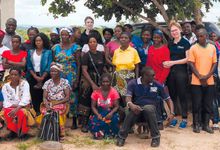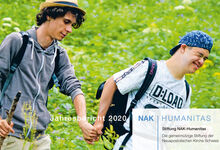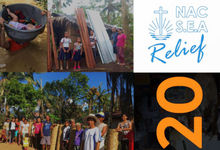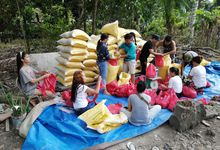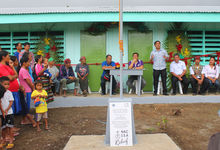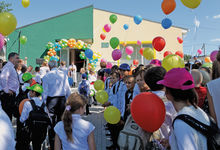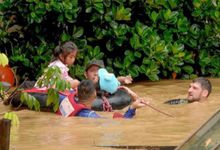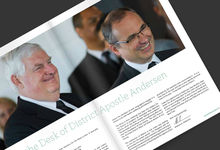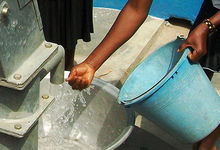Showing solidarity even through a pandemic
Would people cut back on donations during the pandemic? This was the anxious question that confronted the New Apostolic relief agency NAK-karitativ in 2020, the year when COVID-19 first reared its head. The answer is to be found in the organisation’s most recent annual report, which is now available.
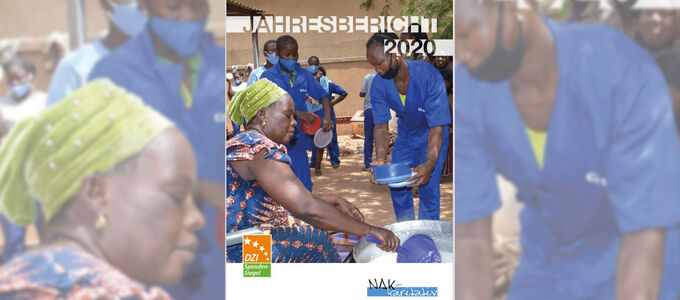
„“The year 2020 was a year that challenged us all,” writes Tatjana Augustin, the new Managing Director of NAK-karitativ in the foreword to the 2020 annual report. “From the southern hemisphere we have heard the sentiment that people would rather die of COVID-19 than hunger—a tragic statement that shows just how desperate many of our fellow human beings are.”
It is precisely because the COVID-19 pandemic has even more clearly highlighted the consequences of existing adversities that it is so important “to improve living conditions in the southern hemisphere over the long term so that people are less susceptible to crises and can better take care of themselves.”
A slight increase in donations
The New Apostolic relief organisation from Germany was therefore relieved to find that the COVID-19 pandemic had not changed the solidarity of its donors in the year 2020. On the contrary: NAK-karitativ's donation income even increased by a good 4 percent to over 3.3 million Euros.
As one would logically expect, income from the collection of donations decreased, since it was hardly possible for any of the local congregations to initiate collection drives. A brief overview in the annual report shows that some congregations nevertheless managed to get creative and swiftly organise Christmas bazaars, youth classes, and murder mystery dinners online.
Pandemic actually helped save money
NAK-karitativ also managed to save quite a bit of money during the pandemic, although these savings were not quite the kind the organisation had in mind. Since there were no major events, it was possible to reduce material costs by almost 60 percent. Of course, the annoying thing was that it was impossible to travel to the relevant countries to see whether the projects there were really going as planned. But this is where the reliability of the partner organisations and the strength of the organisation’s cooperation with local parties became apparent. In fact, it may even be possible to expand on this approach in the future.
Projects that responded to the pandemic
Since it was impossible to foresee the commitment level of donors during the COVID-19 crisis, the relief agency preferred to remain cautious. Only five new projects were initiated in 2020. The aid organisation was mainly concerned with alleviating the hardship of those particularly affected by the pandemic.
In South Sudan, for example, it was possible to supply more than 1,200 families with food packages, and provide over 400 teachers for the year’s graduating classes with the help of the local New Apostolic Church and the financial support of the Southern German aid organisation known as Human aktiv
NAK-karitativ distributed masks and gloves in six prisons in both Malawi and Zambia. In addition, the organisation set up washing stations with sanitisers and equipped community meeting areas with disinfectants. In sub-Saharan Africa, where important projects are stagnating due to the COVID-19 pandemic, NAK-karitativ wanted to at least alleviate the need to some degree and so distributed food packages and vouchers to 8,500 people in collaboration with its partner organisation, the Masakhe Foundation. Another 4,000 people were supported by way of soup kitchens.
In Kenya too, the relief agency was able to support some 650 families with food parcels, this time in collaboration with the New Apostolic aid organisation KUMEA.
In Burkina Faso, NAK-karitativ supported a vocational school in the production of protective masks, and, together with its partner organisations CFIAM and Poteram Si Voletam, ensured that the school’s trainees and teachers—along with another 75 families—were fed.
Many of these projects were also continued in 2021, but NAK-karitativ always strives to provide long-term and sustainable aid so that the respective country can continue to develop on its own.
Warm thanks to all donors
In his message of greeting, the patron of NAK-karitativ, retired Chief Apostle Wilhelm Leber, writes as follows: “I would like to express my heartfelt thanks to everyone who has made a contribution. I was pleased to discover that the commitment of our donors remains unbroken even in these difficult times, and I wish the rich blessings of God to all those who have been willing to help in this effort.”
Article info
Author:
Date:
Keywords:
Katrin Löwen
06.09.2022
Aid agencies,
Social commitment,
International,
Congregational life


